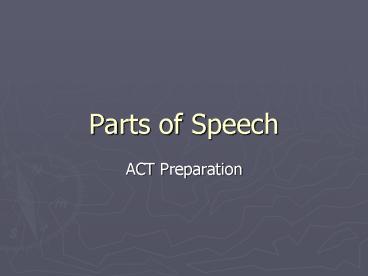Parts of Speech - PowerPoint PPT Presentation
1 / 18
Title: Parts of Speech
1
Parts of Speech
- ACT Preparation
2
Noun
- Names a person, a place, a thing, or an idea
- Examples
- Persons dentist, cousin, Tiger Woods, Mrs.
Mendoza - Places kitchen, Detroit, Grand Canyon, mall
- Things notebook, map, Washington Monument,
chair - Ideas bravery, talent, self-esteem, Buddhism
3
Common vs. Proper Nouns
- Common Nouns names any one of a group of
persons, places, things, or ideas (generally not
capitalized) - Examples poet, city, game, philosophy
- Proper Nouns names a particular person, place,
thing, or ideas (generally capitalized) - Examples Katie Perry, St. Louis, Super Bowl, Zen
4
Concrete vs. Abstract Nouns
- Concrete Nouns names a person, place, or thing
that can be perceived by one or more of the five
senses - Examples snow, lemon, birds, cotton, yogurt
- Abstract Nouns names an idea, a feeling, a
quality, or a characteristic that cannot be
perceived by the senses - Examples guilt, perseverance, joy, Buddhism,
humility
5
Collective vs. Compound Nouns
- Collective Nouns name a group of people,
animals, or things - Examples audience, batch, bunch, cluster, crew,
family, flock, group, herd, jury - Compound Nouns uses two or more words together
to name a person, place, thing, or idea - Examples hairbrush, noisemaker, baby sitter,
high school, San Diego, jack-in-the-box,
half-moon, self-esteem
6
Pronouns
- Pronouns a word used in place of one or more
nouns or pronouns - Examples Personal, Reflexive, Intensive
7
Personal Pronouns
- Personal Pronouns stand for one speaking (1st
person), the on spoken to (2nd person), or the
one spoken about (3rd person) - Examples
- 1st person I, me, my, mine, we, us, our, ours
- 2nd person you, your, yours
- 3rd person he, him, she, her hers, it, its,
they, them, their, theirs
8
Reflexive vs. Intensive Pronouns
- Note Reflexive and intensive pronouns end with
the suffix self and selves. - Reflexive Pronouns stand for the subject of the
sentence and completes the meaning of the verb or
act as object of a preposition - Example The cat taught itself how to open the
screen door. - Intensive Pronouns stress its antecedent and is
not required in order for the sentence to make
sense. - Example Gail prepared dinner herself.
9
Demonstrative vs. Interrogative Pronouns
- Demonstrative Pronoun points out a specific
person, place, thing, or idea - Examples
- Singular nouns this and that
- Plural nouns these and those
- Interrogative Pronoun introduces a question
- Examples what, which, who, whom, whose
10
Relative vs. Indefinite Pronouns
- Relative Pronoun introduces a subordinate
clause (clause with a subject and verb, but does
not express a complete thought and cannot stand
alone) - Examples that, which, who, whom, whose
- The UFO that we saw was only a weather balloon.
- Indefinite Pronoun refers to a person, place,
thing, or idea that may or may not be
specifically named - Examples both, many, someone, all, either
- Both of my brothers and many of their friends
work at the mall.
11
Adjective
- Adjective modifies a noun or a pronoun
- Adjective tells
- WHAT KIND handmade quilt, red sneakers
- WHICH ONE this camera, second place
- HOW MANY seven apples, many options
- HOW MUCH more bread, enough light
12
Verbs
- Verbs express action or state of being
- Examples The cat dashed through the room.
Main vs. Helping Verbs
- Helping Verbs may, can, could, might, shall,
should, must, will, and would - Examples They could not have found the treasure
without the map.
13
Action vs. Linking Verbs
- Action Verbs expresses either physical or
mental activity - Examples Lana moved the furniture and shampooed
the carpet. - Linking Verbs connect the subject to a word or
word group in the predicate called a subject
complement (identifies or describes the subject
and completes the meaning of the linking verb) - Examples The woman in the navy blouse is my
mother. - Your zucchini casserole smells delicious.
14
Transitive vs. Intransitive Verbs
- Transitive Verb directs an action toward an
object (a word that tells who or what receives
the action of the verb) - Examples We placed some napkins on the table.
- Edgar Allan Poe wrote many stories and poems.
- Intransitive Verb does not express its action
toward an object - Examples Nelda whispered in Amelias ear.
- The horse whinnied loudly.
15
Adverb
- Adverb modifies a verb, an adjective, or
another adverb - Examples
- Adverbs Modifying Verbs
- HOW The rain gently fell.
- WHEN Yesterday I received your letter.
- WHERE Garland lives here.
- TO WHAT EXTENT The coyote roamed widely.
16
Adverb
- Adverb modifies a verb, an adjective, or
another adverb - Examples
- Adverbs Modifying Adjectives
- That particularly slow computer needs to be
repaired. - Adverbs Modifying another Adverb
- The game ended very quickly.
17
Preposition
- Preposition shows the relationship of a noun or
pronoun, called the object of the preposition, to
another word - Examples
- about before during near to
- above behind except of toward
- after beneath for on up
- against beside from out with
- among between in over within
- at by throughout into without
- The ball rolled under the truck.
18
Conjunction and Interjection
- Conjunction joins words or word groups
- COORDINATING and, but, for, nor, or, so, yet
- CORRELATIVE both, and, not onlybut also,
eitheror, neithernor, whetheror - SUBORDINATING after, although, because, before,
how, if, in order that, so that, unless, until,
whenever, whether, while, why - Interjection expresses emotion and has no
grammatical relation to the rest of the sentence - Ah! Aha! Hey! Oh! Ouch! Uh-oh! Well! Whew! Wow!































